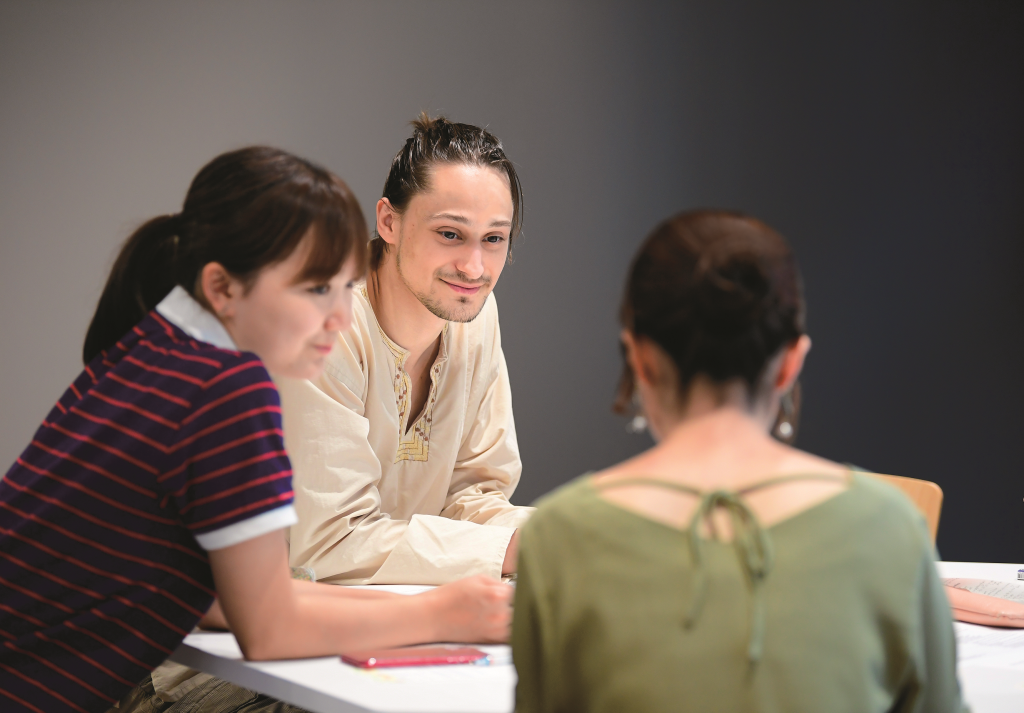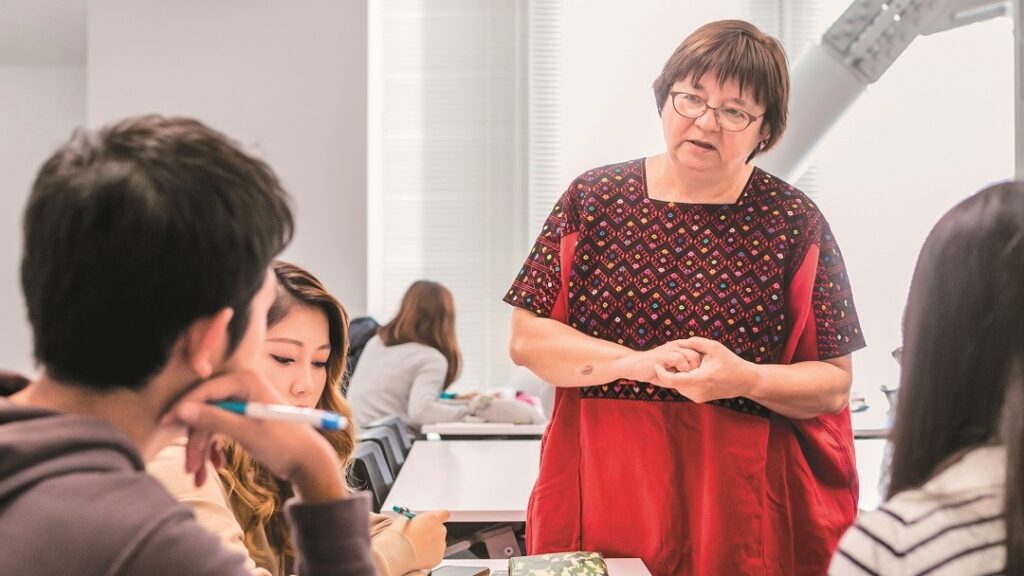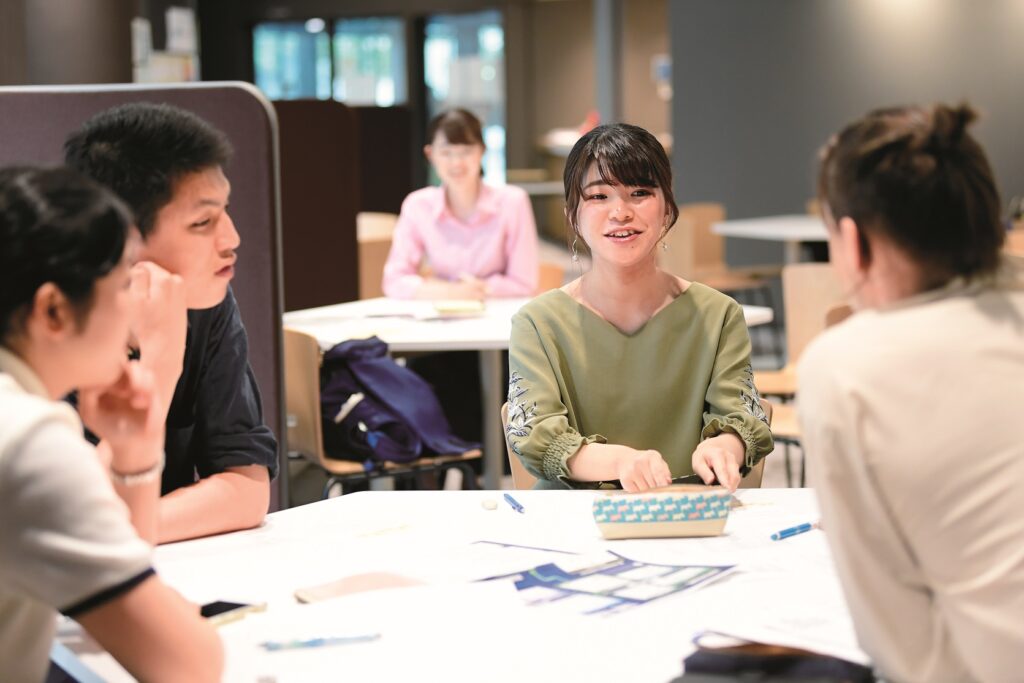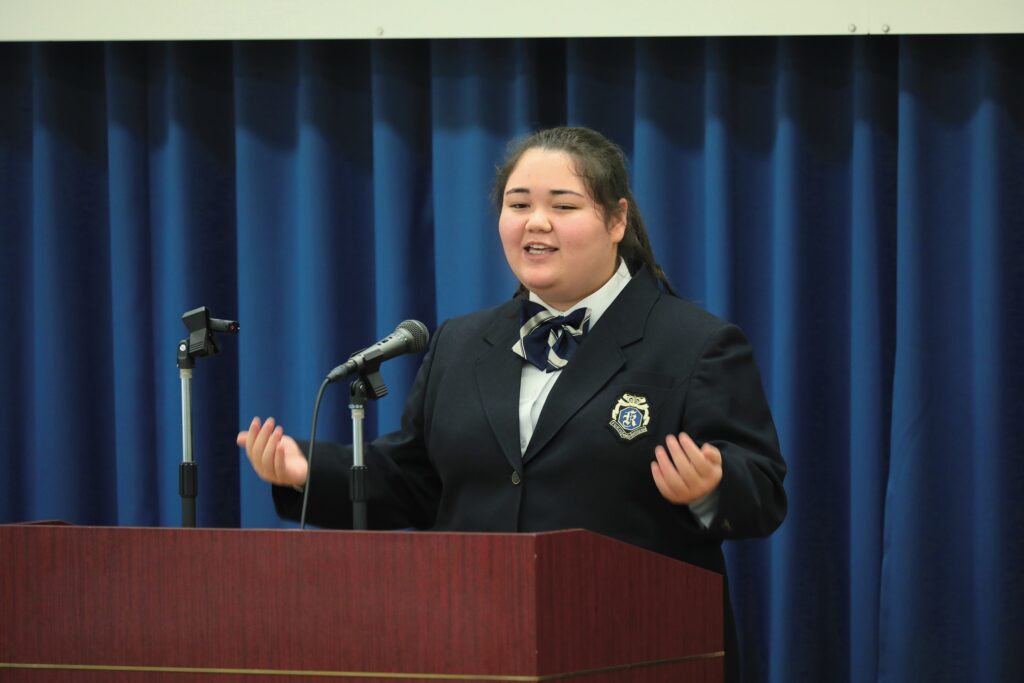Language Education
To cultivate the language skills necessary for interacting with global society and deepening an understanding of different cultures and values, Sophia University offers a variety of language courses and is highly supportive of students simultaneously acquiring multiple languages.
English Courses

This program aims to help students acquire English language skills like learning and thinking and collaborating with others in English.
Academic Communication (AC) 1 & 2 are required during the first year and incorporate the Content and Language Integrated Learning (CLIL) method. In AC1, a spring semester course, students improve their English for Academic Purposes (EAP) skills. In AC2, a fall semester course, students learn academic content in English based on the skills acquired in AC1, thereby developing their critical thinking and collaboration skills.
Students are then free to take elective courses according to their own specialization, needs, and interests to acquire functional English skills.
Placement Tests
New students in departments where English is required must undergo an English placement test administered by the Sophia University Center for Language Education and Research immediately after enrollment to be appropriately assigned to one of seven class levels.
Content and Language Integrated Learning (CLIL)
CLIL is being practiced and researched in many European countries as a new educational method to simultaneously improve knowledge in academic fields and develop language skills. Sophia University is home to the largest CLIL research center in Japan and was one of the first to introduce it into its curriculum. While learning about a variety of topics in English, students develop critical thinking skills, acquire cooperative learning skills, and broaden their international perspectives.
A Wide Variety of Language Courses

Sophia University offers language courses in 22 languages, a truly unique offering. Most students study English and one other language, but many students study three or more languages. The opportunity to study a wide range of languages from a variety of regions is a highly unique feature of Sophia University’s wide range of educational fields and its tradition of global education.
Sophia University’s Language Offerings:
English / Japanese / German / French / Ispania / Italian / Chinese / Korean / Russian / Portuguese / Latin / Indonesian / Filipino / Arabic / Thai / Persian / Cambodian / Burmese / Turkish / Vietnamese / Hindi / Swahili
LLC(Language Learning Commons)

Located on the first floor of Building 6, the LLC supports language learning for undergraduate, graduate, and international students with initiatives to motivate students to learn languages and give back to their classes and fellow students. Books and DVDs can be borrowed to support students who wish to pursue language studies in a variety of ways.
What You Can Do at LLC
- Foreign Language Communication
Small, practical conversational group lessons in a variety of languages to work on speaking and listening skills with a student instructor.
- English Learning Advisor System
Advising students on efficient study methods. For students who wish to study abroad in an English-speaking country or who want to improve their English language skills for their studies and career.
- Beginning Language Learning Advisor
Faculty members in charge of each language provide advice on how to learn a foreign language in general, including preparation for certification exams.
- ALC NetAcademy NEXT
In addition to the four skills of Reading, Listening, Writing, and Speaking, we offer e-learning materials for comprehensive language learning with the addition of vocabulary and grammar skills. Students can use their smartphones or computers to continuously learn English at their own pace.
- Writing Tutor System
A tutoring program to improve English and Japanese writing skills with senior-level, experienced tutors (Available only for languages in which the student is not native)
- Language Exchange
Lunchtime events where international students learning Japanese and students learning foreign languages can introduce themselves and play games, providing a great opportunity to get to know students from other countries while practicing a foreign language.
John Nissel Cup

The John Nissel Cup, Sophia University’s national English speech contest for high school students, has been held annually since 2011, aiming to help high school students improve their English skills by giving them an opportunity to present their thoughts in English in a public forum.
If the winners of this competition are admitted to Sophia University in the future, they will receive various benefits and support.
John Nissel Cup Scholarship
A scholarship (for all four years) is awarded to the top finishers of the John Nissel Cup
- Benefits Eligibility
Those who place within the first 6 top places for the John Nissel Cup
- Benefits Period
Course period (four years)
※ with continued examination
- Benefits Amount
1st place: full tuition fee amount, 2nd – 3rd place: half tuition fee amount, 4th – 6th place: one-third tuition amount
About the Center for Language Education and Research
The Center for Language Education and Research conducts educational and research activities with the goal of further enriching and developing foreign language education, enabling students to acquire skills in a variety of foreign languages necessary to a globalized world and cultural diversification.
For more information on language education at Sophia University and the latest news on the John Nissel Cup, please visit the Center for Language Education and Research (CLER) website at Sophia University.
Faculty Members
Center for Language Education and Research
Director
Tamotsu FUJITA Professor
| Research Areas | Second Language Acquisition,Bilingualism,TESOL |
|---|---|
| Related Articles |
Yoshimi HIROYASU Professor
| Research Areas | Spanish Language Education,Linguistics |
|---|---|
| Related Articles |
Ayako KITAMURA Professor
| Research Areas | French Language Education,French Phonetics,Phonetic Education |
|---|
Kaoru KOYANAGI Professor
| Research Areas | Language Acquisition Theories,Applied Psycholinguistics,Japanese Language Pedagogy |
|---|
Fuyuki MINE Professor
| Research Areas | Second Language Acquisition,Japanese Linguistics,Japanese Language Pedagogy |
|---|
Takafumi SHIMIZU Professor
| Research Areas | Second Language Acquisition,Interlanguage Pragmatics,Japanese Language Pedagogy |
|---|
Yoshiaki SUGIKI Professor
| Research Areas | English Literature |
|---|---|
| Related Articles |
Yasushi FURUTA Associate Professor
| Research Areas | Italian Literature |
|---|
Wanting HUANG Associate Professor
| Research Areas | Linguistics (Discourse Analysis,Semantics,Pragmatics),Chinese Language Education |
|---|
Yasuhiro IMAI Associate Professor
| Research Areas | Second Language Education,Emotion and Learning,Individual Psychology (Adlerian Psychology) |
|---|---|
| Related Articles |
Ahran KIM Associate Professor
| Research Areas | Japanese-Korean Contrastive Linguistics |
|---|---|
| Related Articles |
Akiko MASAKI Associate Professor
| Research Areas | German Phonetics,Phonetic Education |
|---|---|
| Related Articles |
Itsuki NAGASAWA Associate Professor
| Research Areas | Pedagogical Japanese Grammar & Vocabulary,History of the Japanese Language,Japanese Language Pedagogy |
|---|
Takanori SATO Associate Professor
| Research Areas | Applied Linguistics,Language Testing,English as a Lingua Franca |
|---|---|
| Related Articles |
Katsuya YOKOMOTO Associate Professor
| Research Areas | Applied Linguistics,TESOL |
|---|
Graham MACKENZIE Project Professor
| Research Areas | English as a Medium of Instruction,Attitudes to the English Language in Japan,CLIL |
|---|
Elisa Ramona ACOSTA Lecturer
| Research Areas | Group Dynamics,Student Autonomy,Second-language Acquisition,Intercultural Communication |
|---|
Alexander BABULALL Lecturer
| Research Areas | Negotiated Syllabi,Practical Activities for Developing,Language Skills and Process Writing |
|---|
Garcia CHAMBERS Lecturer
| Research Areas | Aesthetic Appreciation in English Education,Japanese Aesthetics,Applied Contemporary Aesthetics,Postcolonial Literature |
|---|
Emi FUKASAWA Lecturer
| Research Areas | Applied Linguistics,Interlanguage Pragmatics |
|---|
Brendan GARLAND Lecturer
| Research Areas | Applied Linguistics,English Literature |
|---|
Reginald GENTRY Lecturer
| Research Areas | Second Language Acquisition,TESOL,Second Language Writing |
|---|
Mayumi KAWASHIMA Lecturer
| Research Areas | Applied Linguistics,Sociolinguistics,Intercultural Communication |
|---|
Koji KOBAYASHI Lecturer
| Research Areas | Japanese Linguistics,Japanese Language Pedagogy |
|---|
Angelina KOVALYOVA Lecturer
| Research Areas | Writing Competence,MALL (mobile-assisted language learning),EFL (English as a foreign language) |
|---|
Coline MAILLEUX Lecturer
| Research Areas | French Language Education,Online Learning |
|---|
Jason McEVOY Lecturer
| Research Areas | Anthropology,Ethnography,Critical Thinking,and Intercultural Pragmatics |
|---|
Mika NAGASU Lecturer
| Research Areas | Japanese Linguistics,Japanese Language Education |
|---|
Sayaka NAKAJIMA Lecturer
| Research Areas | Spanish Language Education,History of Chilean Culture in the 20th Century |
|---|
Kiyoshi NOGUCHI Lecturer
| Research Areas | Applied Linguistics,Japanese Language Education |
|---|
Matthew SCHAEFER Lecturer
| Research Areas | Applied Linguistics,TESOL |
|---|
Tokiko SERA Lecturer
| Research Areas | Japanese Linguistics,Japanese Language Education |
|---|
Michael WALKER Lecturer
| Research Areas | Applied Linguistics,TESOL,Pragmatics |
|---|
Masako YONEZAWA Lecturer
| Research Areas | Japanese Linguistics,Japanese Language Education |
|---|
Zhang Tong Lecturer
| Research Areas | Teaching Chinese as a second language,Physical and health education |
|---|